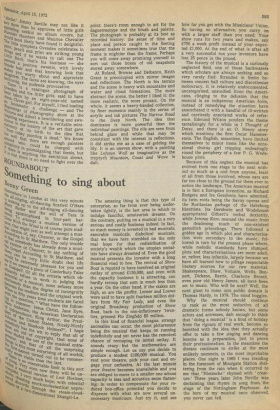The amazing thing is that this type of enterprise, so
far from ever being undertaken lightly, is the last area in which to indulge fanciful, amateurish dreams. On the contrary, putting on a musical in a very serious and costly business indeed. In fact, so much money is invested in bad musicals, execrable musicals, diabolical musicals, that we have here stumbled on the only real hope for that redistribution of society's wealth which the utopian socialists have always dreamed of. Even the good musical presents the investor with a long financial road to hoe. The revival of Show Boat is reputed to have involved an original outlay of around £150,000, and even with the capacity business it is attracting, can hardly recoup that sum in much less than a year. On the other hand, if the stakes are high, so are the profits. Lerner and Loewe were said to have split fourteen million dollars from My Fair Lady, and even the original Broadway production of Show Boat, back in the non-inflationary 'twenties, grossed Flo Ziegfeld $5 million. In this kind of financial league, strange anomalies can occur, the most picturesque being the musical that keeps on running indefinitely and yet never has the remotest chance of recouping its initial outlay. It sounds crazy but the mathematics are simple enough. Let us say you decide to produce a modest £100,000 musical. You rent your theatre, pick your cast and engage your orchestra. At the last minute your theatre becomes unavailable and you are obliged to move to a smaller one whose capacity is less and acoustics more flattering. In order to compensate for your reduced box-office potential you decide to dispense with what are now several unnecessary musicians. Just try it, and see how far you get with the Musicians' Union. So having no alternative, you carry on with a larger staff than you need. Your show runs for two years and makes, say £750 a week profit instead of your expected £1,000. At the end of what is after all a very successful run your investors have lost 25 pence in the pound.
The history of the musical is a curiously neglected field, one of those backwaters which scholars are always seeking and so very rarely find. Stranded in limbo between concert hail culture and discotheque mobocracy, it is relatively undocumented, uncategorised, unstudied. Even the Americans, clinging to the delusion that the musical is an indigenous American form, instead of remedying the situation have exacerbated it with a handful of ill-written and carelessly annotated works of reference. Edmund Wilson ponders the theme tantalisingly for a while in I Thought of Daisy, and there is an 0. Henry story which mentions the first Oscar Hammerstein. The English, meantime, have limited themselves to minor items like the occasional chorus girl tripping endearingly round the periphery of a few P. G. Wodehouse plots. Because of this neglect the musical has evolved from one stage to the next without so much as a nod from anyone, least of all from those involved, whose ears are far too close to the ground for them ever to notice the landscape. The American musical is in fact a European invention, as Richard Rodgers and Ira Gershwin have admitted, its twin roots being the Savoy operas and the Ruritanian garbage of the Habsburg librettists. Ira Gershwin and Wodehouse appropriated Gilbert's verbal dexterity, while Jerome Kern rescued the music from the deadening touch of non-existent gemutlich princelings. There followed a golden age in which plot and characterisation were secondary to the music, followed in turn by the present phase where, while melodic standards have slumped, plots and characterisations are more adult, or, rather, less infantile, largely because we have all learned how to pillage respectable literary sources for our raw material. Shakespeare, Shaw, Voltaire, Wells, Bennett, Dickens, Barrie, Charlotte Brontë, even poor old Henry James, all have been set to music. Who will be next? Well, the next giant to come into public domain is Thomas Hardy, in 1978. The mind boggles.
Why the musical should continue to rank as the most seductive of all dramatic forms nobody knows, but some actors and actresses, daft enough to think that ' doing a musical' is a kind of holiday from the rigours of real work, become so besotted with the idea that they actually offer to take a few singing and dancing lessons as a preparation, just to prove their professionalism. In the meantime the disease continues to strike at the most unlikely moments, in the most improbable places. One night in 1965 I was standing in the forecourt of Moorgate Station sheltering from the rain when it occurred to me that ` Nietzsche ' rhymed with 'creature.' Three years later John Neville was declaiming that rhyme in song from the stage of the Nottingham Playhouse. As the hero of my musical once observed, you never can tell.


































 Previous page
Previous page